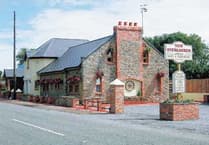LAMMA ’18 - the UK’s largest agricultural trade show which takes place on Wednesday and Thursday, January 17 and 18, is this year introducing a new Farm Safety Zone to help reduce the high number of deaths and injuries on UK farms.
Sponsored by leading health and safety consultancy Safety Revolution, the aim is to help promote the issue of farm safety throughout the year and highlight the fact that most of the 30 fatalities and thousands of injuries that occurred on farms in the past 12 months are avoidable.
The zone will host a series of talks with specialists from the sponsors and the wider industry, enabling visitors to access the most current health and safety information and specialist advice available in the UK agricultural industry.
Elisabeth Mork-Eidem, group head at Briefing Media which organises the event, reminds me that agriculture has one of the highest fatality rates of any industry in the UK and there is clearly more that can be done.
She says: “LAMMA is attended by thousands of visitors, many of whom are potentially at risk and need to consider safety improvements when purchasing new farming equipment. The event is therefore an excellent opportunity to help drive home the message to keep Britain’s farms safe.”
Manager director of the sponsors, Oliver Dale, believes that keeping staff and contractors safe in a farming environment is an ever-increasing challenge across the industry.
“We work closely with our clients to provide advice and guidance in support of preventing accidents and fatalities on farms, estates and agri-businesses across Britain,” said Mr. Dale, adding: “The safety of staff and contractors is central to the success of a business. Our experts will be on hand at the Farm Safety Zone to answer any health and safety queries related to your farm and business.”
Dairy farmers hit again
As we enter 2018, many dairy producers in Wales are again facing substantial milk price cuts.
Carmarthen’s Gareth Richards, chairman of NFU’s Milk Board, comments: “What is extremely concerning and irresponsible at the moment is the unsubstantiated sentiment from various industry commentators, who have been talking the market - if we are not careful - into a new market crash.
“Welsh dairy farmers have been through huge swings in dairy price volatility and we now, it seems, have commentators urging milk buyers to drop prices.
“The NFU in Wales is continuing to call for better dairy market signals as milk price cuts, as recognised by the commentators themselves, don’t work, partly because the impact is too late and too slow in achieving its ultimate aim.
“We are therefore repeating our call on government, both at a UK and Welsh level, to ensure that market data is collected, audited and published to give dairy farmers the right signals as to what’s happening in the market - both on price discovery and demand.
“This is already done in other parts of the world, and should be the starting point for dairy risk management mechanisms in Wales and the UK.
“It’s telling that on milk volume notifications Defra (Ministry of Agriculture) and AHDB (Dairy Producers body) are in disagreement on recent milk production, with Defra’s monthly volumes well below the daily delivery figures collected by AHDB.
“The discrepancy has meant that Defra have not published recent UK milk volume figures and the data for August and September is being investigated and subject to change.
“Up to date, accurate figures on price volume and demand are essential moving forward. Farmers having to base their future milk production plans on inaccurate or incomplete data or industry commentators, as there is no alternative, is extremely concerning and damaging to the industry and we urge government to step up to ensure better transparency in the dairy markets.”
‘Confusion, frustration
and hope’
The largest ever in-depth survey of how people across Wales really feel about politics has been launched in a report that will make uncomfortable reading for many of Wales’ elected representatives.
A total of 807 people across every local authority took part in an independant survey across focus groups as part of their ‘Missing Voices’ project, launched last year to identify the barriers to voting and engaging in politics in Wales.
The research has found that ‘confusion’ and ‘frustration’ were two of the themes from the project, with most participants raising concerns about the level of information available about what happens in Welsh politics.
The report found that 89 per cent of those surveyed have very high confidence in the ‘nuts and bolts’ of democracy in Wales - polling stations and such, 38 per cent are not confident they ‘can really change the way things are run’.
Many identified a lack of knowledge as a major barrier to engagement. One of the main comments was “The political climate has played a role in many feeling distrustful and frustrated with politics,” with responses to the survey and focus groups referencing the expenses scandal, tax evasion and recent allegations of sexual harassment in politics.
But, as well as raising concerns, many people across Wales also talked about their faith in politics and their hope for the future, particularly following a General Election where more turned out to vote, especially young people.
One said “Politics is life, it affects my life and those around me. You can’t turn a blind eye and ignore it, issues need to be addressed, voices need to be heard. There’s a real shift in the way ‘young’ people like me see ‘politics’ and it’s good. There is a revolution coming.”
Survey organiser Jess Blair tells me: “What this exercise has shown is a real sense of frustration, not just at politicians, but at politics in Wales more generally. And what this seems to stem from is a total communication breakdown when it comes to our institutions in Wales.
“The public want politicians and our institutions to communicate much more effectively. The message we heard loud and clear is that voters outside ‘the bubble’ feel left out in the cold.
“While Cardiff Bay is a centre of political engagement, you go half-a-mile down the road and there’s a total feeling of alienation. Devolution was meant to bring politics closer to everyone - but there’s a risk without urgent action it becomes stagnated and confined to just a small part of the capital.”
Never assume anything
Russ Buttacovoli, an 80-year-old Italian, goes to the doctor for a check-up.
The doctor is amazed at what good shape the guy is in and asks, “How do you stay in such great physical condition?”
“I’m Italian and I am a golfer,” says Russ, “and that’s why I’m in such good shape. I’m up well before daylight and out golfing up and down the fairways. I have a glass of vino, and all is well.
“Well,” says the doctor, “I’m sure that helps, but there’s got to be more to it. How old was your father when he died?
“Who said he was dead?”
The doctor is amazed. “You mean you’re 80-years-old and your father’s still alive. How old is he?”
“He’s 100 years old,” says Russ. “In fact, he golfed with me this morning, and then we went to the topless beach for a walk and had a little vino and that’s why he’s still alive. He’s Italian and he’s a golfer, too.”
“Well,” the doctor says, “that’s great, but I’m sure there’s more to it than that. How about your father’s father? How old was he when he died?”
“Who said my Nonno’s dead?”
Stunned, the doctor asks, “You mean you’re 80 years old and your grandfather’s still living! Incredible, how old is he?”
“He’s 118-years-old,” says the old Italian golfer.
The doctor is getting frustrated at this point. “So, I guess he went golfing with you this morning too?”
“No, Nonno couldn’t go this morning because he’s getting married today.”
At this point the doctor is close to losing it. “Getting married? Why would a 118-year- old guy want to get married?”
“Who said he wanted to?”
Thinking ahead
Alison Ebsworth, secretary, writes to remind me that St. Clears YFC Agricultural Show will be held on Saturday, June 16, 2018, at the Carmarthen Showground.
She adds that this year will see the show celebrate its ‘140th Anniversary Show’, which is a remarkable achievement in itself.




